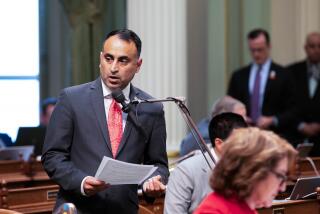Panel Proposes Health Plan to Aid Uninsured
- Share via
WASHINGTON — Proposing a major overhaul of the nation’s health care system, a blue-ribbon commission recommended Monday that the 37 million Americans who lack health insurance be covered under a plan financed largely by $49.8 billion in new taxes on businesses and workers.
The National Leadership Commission on Health Care also proposed measures to curb soaring medical costs and improve the quality of care.
Research Program
A $500 million-a-year research program would be launched to determine, among other things, whether doctors perform unnecessary lab tests and surgery.
The privately formed panel, in a report after a 2 1/2-year study, said that the current national health care bill of $550 billion a year is expected to triple to $1.5 trillion by the year 2000 unless urgent measures are taken.
The plan to make affordable health care available for all Americans--especially the “working poor” not now covered by Medicaid or private plans--is similar to one adopted last year by Massachusetts, calling for the costs to be shared by government, employers and workers.
However, the commission’s proposal differs substantially from controversial legislation sponsored by Sen. Edward M. Kennedy (D-Mass.) and Rep. Henry A. Waxman (D-Los Angeles) that would require all employers to provide health insurance for their workers.
Waxman, chairman of the House Energy and Commerce subcommittee on health and the environment, predicted that the commission’s proposal would give impetus to the legislation, despite the sharp differences.
“Addressing the problem of the uninsured should be the highest priority for Congress this year,” he said. “Hopefully, this proposal will help prod Congress to action.”
The commission’s complex scheme of financing and administration reflects a series of compromises struck by its 34 members, who traditionally support conflicting positions on health policy. The members, including three former presidents--Richard M. Nixon, Gerald R. Ford and Jimmy Carter, who served as honorary co-chairmen--were drawn from the fields of health care, law, economics, politics, ethics and labor.
“Both the public and private sectors are saddled with burgeoning health care costs, and only a creative new partnership between them will solve this problem,” said commission co-chairman Robert D. Ray, former Republican governor of Iowa and president of Life Investors Insurance Co. of America.
“We believe our proposal builds on the strengths of our mixed public-private system to provide access for all Americans to higher quality, cost-conscious health care,” he said at a news conference.
Under the commission’s proposal, the federal government would prescribe a basic package of health benefits for all workers not covered by a company plan. The states would administer the “Universal Access” program, negotiating fees with doctors, hospitals and other health care providers. The Medicaid health insurance program for the poor would be rolled into the new program.
Financing would break down this way:
The $32.5 billion spent by federal and state governments on Medicaid would continue.
Employers would pony up $31.1 billion in new taxes--euphemistically called “premiums” and “fees.” Firms could avoid paying the fees by instituting their own health insurance program.
Workers with incomes above 150% of the poverty level would pay $18.7 billion in new payroll and income taxes; the assessments would rise with income. Workers would pay additional amounts through deductibles and co-payments--that is, they would have to foot part of a doctor or hospital bill.
‘Only $15 Billion’
The commission said that the $49.8 billion in new taxes would be offset by certain factors, meaning that the national health care tab would increase by a net of “only $15 billion.”
However, commission member Uwe E. Reinhardt, Princeton University professor of economics and public affairs, said that he was embarrassed to say that he could not precisely identify the offsetting factors.
More to Read
Sign up for Essential California
The most important California stories and recommendations in your inbox every morning.
You may occasionally receive promotional content from the Los Angeles Times.













